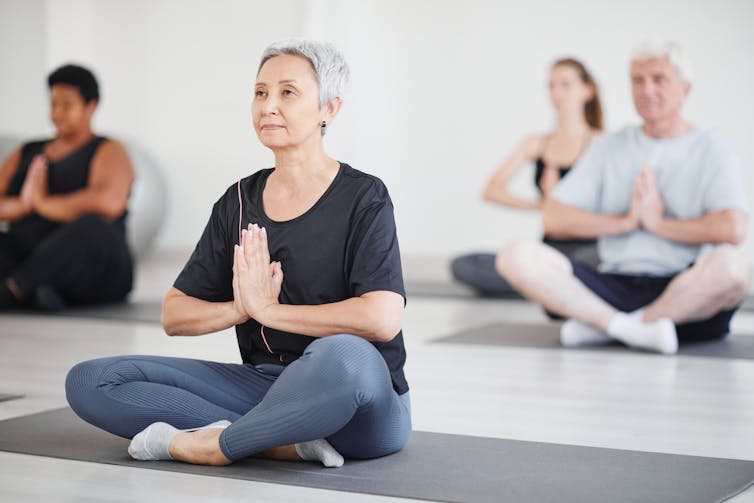The popularity of yoga has grown exponentially over the past decade. More than 10% of American adults have practiced yoga at some point in their lives. Yoga practitioners earn an average of $90 per month, and the yoga industry is worth over $80 billion worldwide.
Yoga is now a popular activity in the US and is commonly described as a healthy lifestyle choice. I’m a behavioral scientist who studies how exercise—and yoga in particular—can prevent and manage chronic disease.
Many people attribute improvements in their physical and mental health to their yoga practice. But until recently, studies on the health benefits of yoga were scarce. As the body of robust research on yoga grows, more work is showing the many health benefits of yoga practice.

Alokprasad/Wikimedia Commons, CC BY-SA
What is yoga?
The name “yoga” is derived from the Sanskrit word “yuj” which means to unite, join or connect the mind, body and soul. The first text on yoga was written by the sage Patanjali in India 2,000 years ago. Patanjali describes yoga as “sita-vrti-nirodah” or “calming the mind.” This is achieved through breath work, meditation, physical activity and body cleansing practices, as well as incorporating ethical and moral rules to live a healthy and purposeful life.
Over the years, different yoga teachers have modified the original Patanjali Yoga, resulting in different styles varying in intensity and focus. For example, some styles of yoga, such as vinyasa, focus on vigorous movements similar to aerobic exercise. Restorative yoga includes additional relaxation poses. Iyengar yoga uses props and emphasizes body precision and proper alignment. These different styles provide options for individuals with different physical abilities.
Generally, yoga instructors in the US teach styles that include postures, breathing exercises, and sometimes meditation.
What does the study show?
As yoga has grown in popularity in recent years, researchers are beginning to study its effects and are finding that it has significant benefits for mental and physical health.
Yoga involves physical movement, so it’s no surprise that most forms of yoga can help improve a person’s strength and flexibility. In one study with healthy volunteers, researchers found that eight weeks of yoga improved muscle strength in the elbow and knee by 10-30 percent. Flexibility in the ankle, shoulder and hip joints increased by 13%-188%.
There are also many less obvious but meaningful benefits of yoga. Research shows that yoga practice can reduce the risk of heart diseases such as high blood pressure, high cholesterol and constipation. Studies in adults have shown significant improvements in balance, mobility, cognitive function and overall quality of life.
Yoga also seems to be effective in managing pain. Studies show that yoga can improve symptoms of headaches, osteoarthritis, neck pain, and low back pain. In fact, the American College of Physicians recommends yoga as one of the first non-drug treatments for chronic low back pain.
Yoga offers many benefits for mental health. Researchers have found that eight to 12 weeks of regular exercise can help reduce symptoms of anxiety and depression, as well as help manage stress.

SeventyFour/iStock via Getty Images
More than exercise
Yoga is a form of exercise that helps to strengthen the body. Many of the benefits researchers have found are due to the physical component of the exercise and are similar to the benefits of other forms of exercise such as running, weight lifting or calisthenics.
But unlike these activities, the practice of yoga involves the mind as a key aspect. By focusing on breath control, holding postures and meditation, yoga increases how much one pays attention to bodily sensations and the present moment. This mindfulness leads to many benefits not found in other forms of exercise.
Studies have shown that mindfulness training can increase a person’s self-awareness, identify with emotional stress and respond with skill. In fact, it can give a person more control over long-term behavior. One study found that increased mindfulness from yoga helped people better perceive and respond to feelings of satiety when eating, reduced overeating, and reduced anxiety about how their bodies looked.
My colleagues and I observed similar results in a study of yoga for individuals with type 2 diabetes. After practicing yoga twice a week for three months, several participants paid more attention to their diet, snacking less and eating healthier, even without any nutritional intervention. Our patients reported lower stress and increased willingness to participate in other physical activities.
How yoga relates to mental health differs markedly from Western exercise. If we do more research, it may be possible to understand the biological mechanisms as well.
Things you need to know if you want to start doing yoga
Yoga may not be beneficial for all medical conditions or right for everyone, but people of all ages, body types, and physical abilities can practice yoga. It can be a form of mental and physical exercise for people who don’t sweat during vigorous exercise, or for people with medical or physical conditions who find working out at the gym challenging.
Although yoga is generally safe, it’s important to keep in mind that, like any other form of exercise, there is a risk of injury. Individuals with medical conditions who are new to yoga should first practice it under the supervision of a trained instructor.
If you decide to try yoga, first talk to a yoga instructor to assess whether the style they offer suits your preferences and fitness level. Remember, you may need to practice for two weeks to feel the benefits physically and mentally.
[ad_2]
